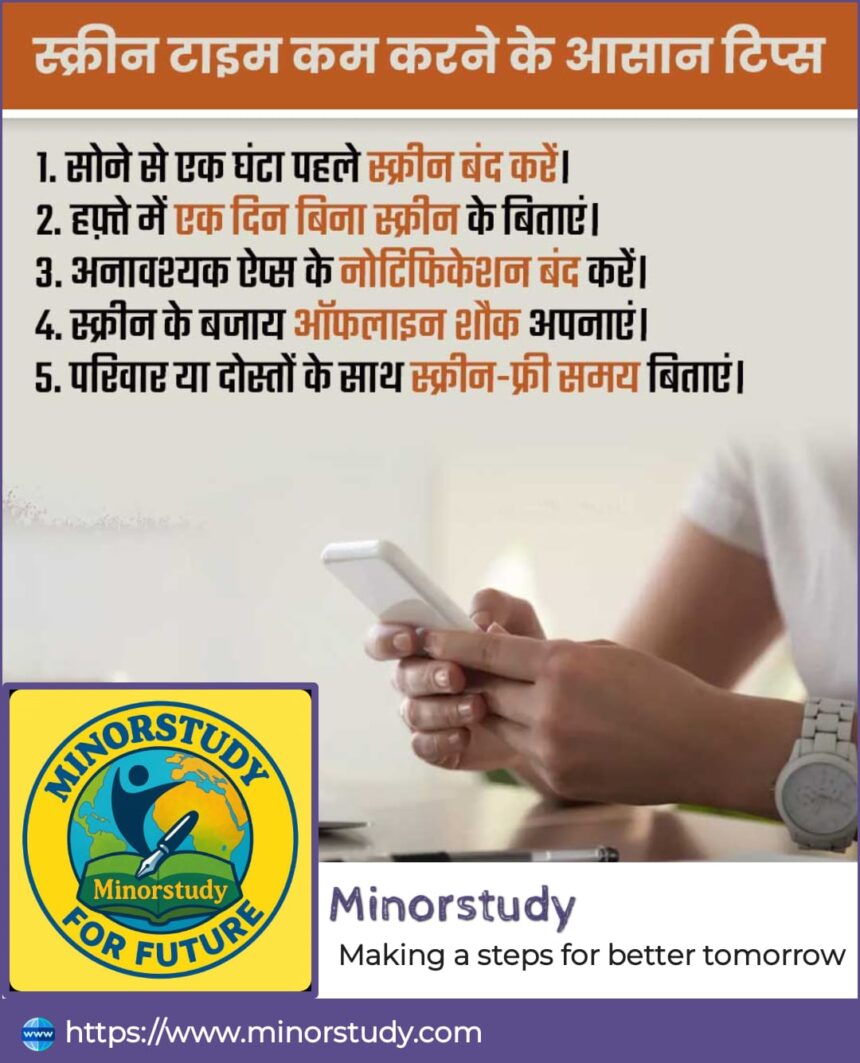🌐 Introduction: Why Reducing Screen Time Is More Important Than Ever
Screen Time: In our digital age, screens are everywhere — from the moment we wake up until we fall asleep. Mobile phones, laptops, tablets, TVs, and even smartwatches dominate our daily routines. But what was once a source of convenience has increasingly become a source of stress, anxiety, and poor mental health.
- 🌐 Introduction: Why Reducing Screen Time Is More Important Than Ever
- 🕰️ A Brief History of Screen Usage
- 📊 Surprising Facts About Screen Time
- 💡 5 Life-Changing Tips to Reduce Screen Time
- 📵 1. Turn Off Screens an Hour Before Bedtime
- 🌱 2. Spend One Screen-Free Day a Week
- 🔕 3. Turn Off Notifications for Unnecessary Apps
- 🎨 4. Take Up Offline Hobbies
- 👨👩👧👦 5. Spend Screen-Free Time with Family or Friends
- 🧠 Significance of Reducing Screen Time
- 📆 Timeline: How to Gradually Reduce Screen Time
- 💬 FAQs About Screen Time and Its Effects
- ❓ Is all screen time bad?
- ❓ How much screen time is too much?
- ❓ What are signs of screen addiction?
- ❓ Are there tools to help reduce screen time?
- 🎉 Observance: Global Digital Detox Movement
- 💌 Wishing & Motivation for a Screen-Free Life
- 🌍 Importance in Our Lives and Society
- 🧬 Daily Life Impacts of Reducing Screen Time
- 📝 Conclusion: The Time to Reclaim Your Life Is Now
Reducing screen time is no longer just a suggestion; it’s a necessity for a healthy, balanced, and fulfilling life.
🕰️ A Brief History of Screen Usage
1927 – First television demonstration.
1950s-60s – TV enters most American and European homes.
1980s – The personal computer boom begins.
1990s – Mobile phones become common.
2007 – Launch of the iPhone revolutionizes digital screens.
2010s – Rise of social media and binge-watching culture.
2020s – COVID-19 increases dependency on screens for remote work, education, and entertainment.
Today, the average adult spends 7+ hours per day on screens. This exponential increase has led to a global conversation about digital wellness and screen-time reduction strategies.
📊 Surprising Facts About Screen Time
📱 The average smartphone user touches their phone over 2,600 times per day.
🧠 Excessive screen use is linked to digital dementia, sleep disorders, and attention span reduction.
👶 Children aged 8–18 spend more than 7 hours/day on screens, often more than time spent in school.
🧘 Screen detox can improve mood, focus, and relationships in as little as 1 week.
💻 More than 80% of adults experience digital eye strain.
💡 5 Life-Changing Tips to Reduce Screen Time
📵 1. Turn Off Screens an Hour Before Bedtime
Blue light emitted by screens disrupts the production of melatonin, a hormone responsible for sleep. By turning off screens an hour before bedtime, you allow your mind and body to unwind naturally.
🔹 Pro Tip: Replace screen time with a warm bath, gentle stretches, or reading a physical book.
🌱 2. Spend One Screen-Free Day a Week
Designate a day like Sunday as a “Digital Detox Day”. No phones, no laptops — just human connection and nature.
🔹 Pro Tip: Plan outdoor activities, family cooking, or local volunteering to keep yourself engaged.
🔕 3. Turn Off Notifications for Unnecessary Apps
App notifications are engineered distractions. Disable them for apps like social media, news, or games.
🔹 Pro Tip: Keep only essential alerts — such as calls, calendars, or reminders.
🎨 4. Take Up Offline Hobbies
Find passion in non-digital activities like:
Painting
Gardening
Board games
Reading
Cooking
Offline hobbies stimulate creativity, reduce stress, and improve focus.
👨👩👧👦 5. Spend Screen-Free Time with Family or Friends
Quality time without screens enhances empathy, connection, and emotional wellness.
🔹 Pro Tip: Set “no-phone zones” during meals or outings to build stronger human bonds.
🧠 Significance of Reducing Screen Time
Reducing screen time is about reclaiming your attention, emotions, and overall well-being.
✅ Physical Benefits:
Reduces eye strain and headaches
Improves sleep quality
Encourages physical activity
✅ Mental Benefits:
Lowers anxiety and digital fatigue
Boosts concentration and memory
Reduces exposure to online negativity
✅ Social Benefits:
Increases face-to-face interactions
Strengthens real-life relationships
Improves listening and communication skills
📆 Timeline: How to Gradually Reduce Screen Time
| Week | Action Step |
|---|---|
| Week 1 | Track your current screen time using an app like Digital Wellbeing or Screen Time |
| Week 2 | Remove non-essential apps and turn off notifications |
| Week 3 | Introduce “No Screen Zones” (e.g., bedroom, dining table) |
| Week 4 | Start one full screen-free day per week |
| Week 5 | Replace evening screen time with a hobby |
| Week 6 | Reflect and adapt — keep what works, drop what doesn’t |
💬 FAQs About Screen Time and Its Effects
❓ Is all screen time bad?
No. Productive screen time (learning, working) is fine in moderation. It’s passive consumption and excessive use that causes harm.
❓ How much screen time is too much?
For adults, more than 4 hours/day of non-work screen time can start causing harm. For children, 1-2 hours/day is the recommended maximum (non-educational).
❓ What are signs of screen addiction?
Feeling anxious without your phone
Using screens to escape emotions
Neglecting responsibilities or relationships
Difficulty sleeping after screen use
❓ Are there tools to help reduce screen time?
Yes:
Focus Apps (Forest, Freedom)
Phone Settings (Downtime, Screen Limits)
Wearables to remind you to move
🎉 Observance: Global Digital Detox Movement
Many organizations promote screen awareness through observances like:
National Day of Unplugging (USA) – Held annually in March.
Digital Detox Week – Encouraging device-free moments.
Screen-Free Week (Global) – Celebrated across schools and workplaces.
These initiatives help raise awareness and promote digital mindfulness globally.
💌 Wishing & Motivation for a Screen-Free Life
🌟 “May you rediscover the joy of real conversations, feel the calm of a screen-free evening, and find deeper connections beyond the scroll. Your well-being is worth disconnecting for.”
Sometimes, less screen time means more life.
🌍 Importance in Our Lives and Society
Reducing screen time isn’t just about individual health; it affects:
Parenting – Children imitate adult screen habits.
Education – Encourages active learning over passive watching.
Environment – Less screen time can mean lower energy use.
Workplaces – Promotes mindful breaks and better productivity.
In a world becoming increasingly digital, digital discipline is power.
🧬 Daily Life Impacts of Reducing Screen Time
| Area | Improvement |
|---|---|
| 🧠 Mental Clarity | Improved focus and decision-making |
| 😴 Sleep | Deeper, more restful sleep |
| 💬 Communication | Better listening and eye contact |
| 🏃 Physical Health | More movement, less strain |
| ❤️ Relationships | Greater presence and bonding |
📝 Conclusion: The Time to Reclaim Your Life Is Now
We often hear “time is money,” but in today’s world — attention is the real currency. Constant screen use drains our energy, attention, and relationships. By applying even a few of these simple tips, you can dramatically improve your physical, emotional, and mental well-being.
In a hyper-connected world, disconnecting is a radical act of self-care.
Remember: Your screen doesn’t own your time. You do.








